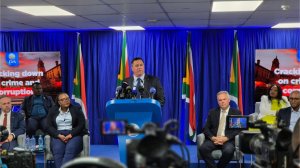Democratic Alliance (DA) leader John Steenhuisen on Monday stated that while the country “bleeds with a failing economy" and high unemployment rate, R700-million will be spent on the upcoming National Dialogue, which he sees as a “talk shop with no action, no reform, no plan, and by the looks of things, dwindling support with the announcement of further withdrawals from major foundations in South Africa”.
In a few days, the Government of National Unity (GNU) is expected to hold its first National Convention in Pretoria, in preparation for the National Dialogue.
Last week, seven legacy foundations announced their withdrawal from the structures of the National Dialogue Preparatory Task Team and the related National Convention, citing violations of the Dialogue’s core principles.
The DA had also announced its withdrawal from the National Dialogue weeks back, after President Cyril Ramaphosa fired one of its Deputy Ministers from office.
Flanked by his DA Ministers at the party's headquarters in Bruma, in Johannesburg, Steenhuisen described the National Dialogue as an illegitimate initiative, that he said lacked credibility.
“…even former President [Thabo] Mbeki has now come to the same conclusion as the DA,” he said.
In July, in an open letter addressed to Steenhuisen, Mbeki accused the DA of undermining an inclusive, citizen-led initiative that intended to create a new national consensus.
He argued that the DA’s continued participation in the GNU, while refusing to engage in the Dialogue that was meant to shape the country’s political future, represented a contradictory and ill-considered stance.
The cost of the National Convention had also been a point of contention since it was announced by Ramaphosa in June; however, on Monday National Convention organising committee chairperson Boichoko Ditlhake said that there were reduced costs associated with the hosting of the National Dialogue and the funding plan was done with the intention to reduce the burden on the national fiscus.
Steenhuisen said his party had not been invited to be involved in the organisation and conceptualisation of the Dialogue, and that it was “one-sided” and was being driven by the African National Congress (ANC).
“We felt that it was being abused as a political process by the ANC, to try and reconnect with the voter base after the past elections,” said Steenhuisen.
He said these concerns were confirmed in the letter Mbeki wrote to him, indicating that Mbeki had been in discussion with the ANC and the party’s National Executive Committee around the formulation of the dialogue.
Steenhuisen said it was important that GNU partners “learn to dialogue”, highlighting that a National Dialogue could not take place when the 10 parties under the GNU were not able to have a conversation with each other on the way forward.
He said South Africans were tired of talk-shops, colloquiums and symposiums, noting that the problem was the implementation of existing policies.
“…and here we are about to embark on another talk-shop that will never be implemented. We know what South Africa’s problems are, we have poor economic growth, crime and a situation of deepening equality that still exist,” he said.
DA’S PLAN TO BOOST THE ECONOMY
Steenhuisen outlined a set of “non-negotiable” demands for reform that the DA said would kickstart the country’s economy and set South Africa on a path to growth and jobs.
He told Polity that he was confident that the plan would shift sentiment, drive the economy forward, and ensure that South Africans had a “fighting chance” to grow businesses.
He explained that his party would target what it believed were three major roadblocks – broad-based black economic empowerment (BBBEE), employment equity and the Expropriation Act.
The DA has been vocal about these policies, with the party calling for comprehensive red tape reduction and deregulation across the entirety of the South African economy.
“BBBEE and racial quotas have failed, and together with expropriation without compensation, create an environment that deters investment, growth and job creation for the majority of South Africans.
“These policies are simply not fair. They don’t help the millions of South Africans. These policies must go,” Steenhuisen said.
He stressed that his party was not against transformation, as suggested by the ANC, but it believed that BBBEE “has done nothing” for South Africans.
He accused the ANC’s “poor policy choices” of being anti-transformation, claiming that these policies had trapped South Africans.
“The only way South Africa will transform is through fair, inclusive alternatives that can help lift poor South Africans out of poverty and onto the social mobility ladder. We need to free up the economy so that South Africans grow their own businesses, creating millions of jobs in the process. The only empowerment South Africa needs is more jobs. With more jobs and a growing economy, many of our other problems will be solved,” he stated.
To fix the country’s energy crisis, the DA suggested breaking Eskom’s monopoly over electricity generation, to create “a truly competitive” energy market.
It would introduce competition and investment into generation and distribution, Steenhuisen said.
He added that it would also ring-fence municipal electricity revenue to maintain and reinvest in the country’s “crumbling” infrastructure.
Steenhuisen said the DA’s plan also aimed to repair and modernise rail, ports, and digital infrastructure, noting that government needed to urgently concession freight rail and port terminals, ending what he said was Transnet’s stranglehold.
The DA would reform public spending towards growth, Steenhuisen announced, explaining that government needed to stabilise debt, cut waste, and root out ghost employees.
He said public money must build infrastructure and provide frontline services, “not bankroll incompetence”.
Steenhuisen said the DA’s plan would also fix local government and restore the rule of law.
He will table the plan in Cabinet and insist on support from the President for these urgent reforms.
“…we will demand urgent implementation. We will bring it to Parliament, where the real national dialogue belongs,” he said.
EMAIL THIS ARTICLE SAVE THIS ARTICLE ARTICLE ENQUIRY FEEDBACK
To subscribe email subscriptions@creamermedia.co.za or click here
To advertise email advertising@creamermedia.co.za or click here










